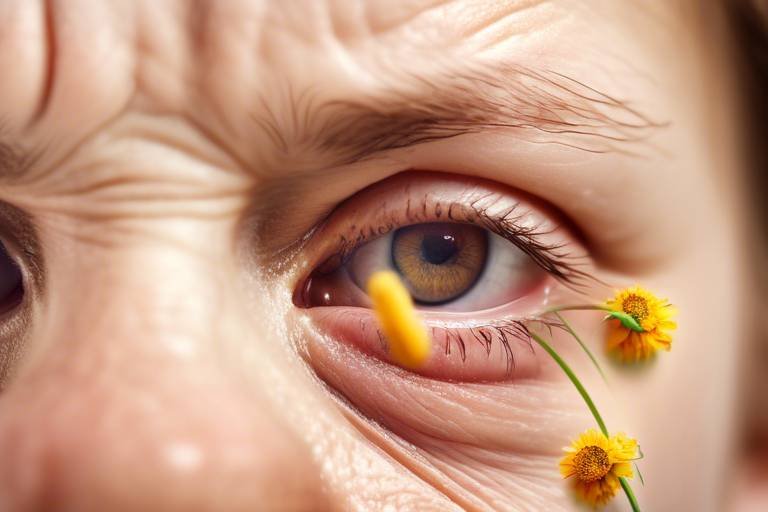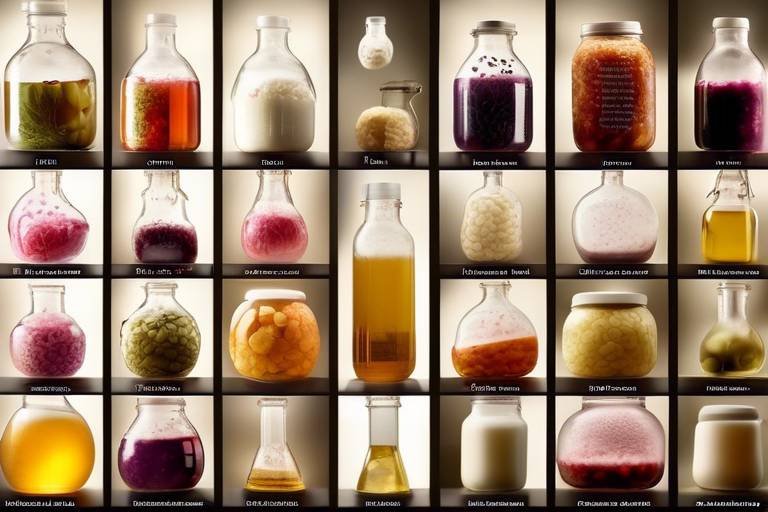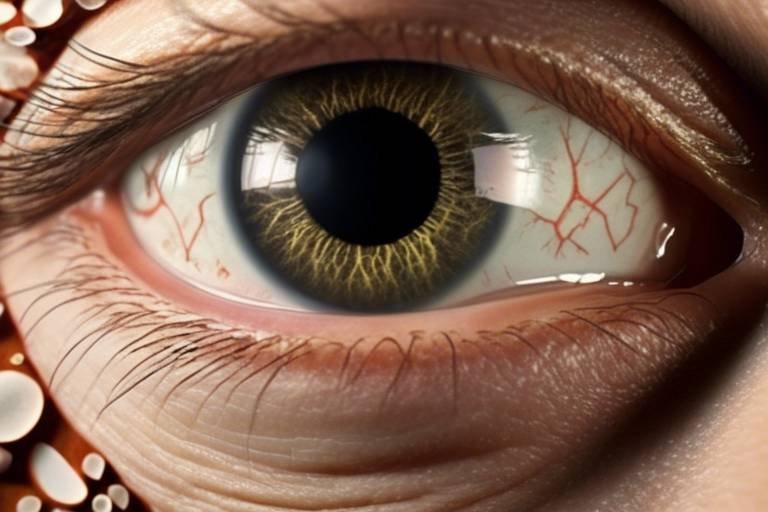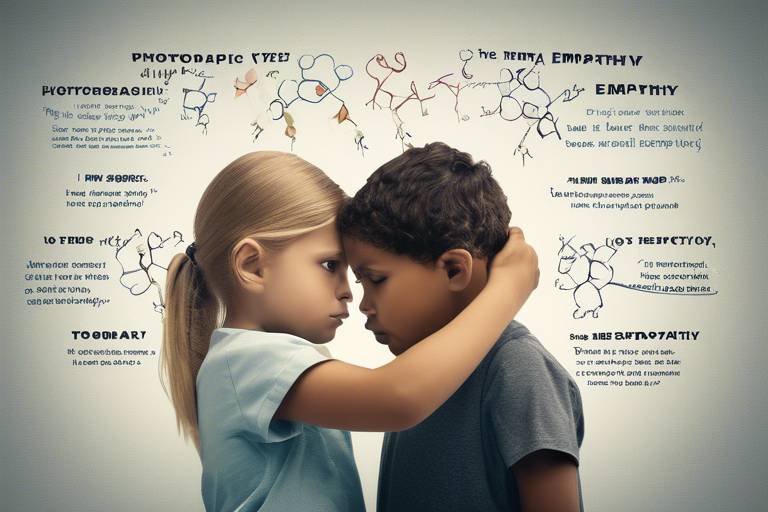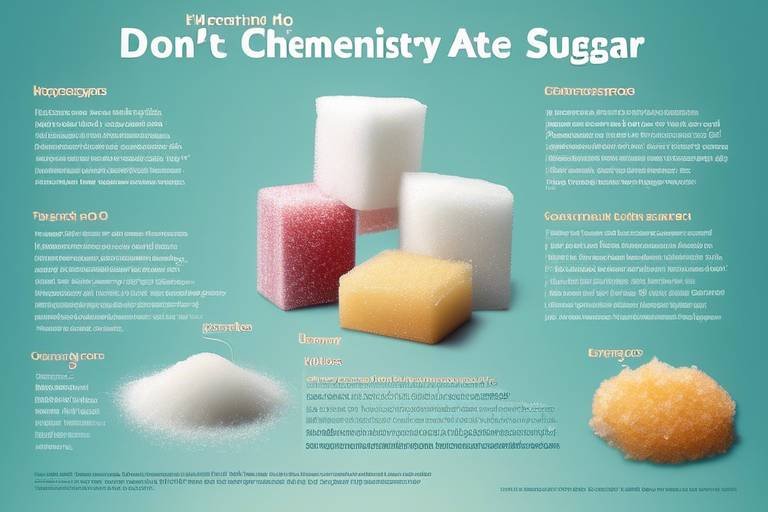The Science of Aging - What Happens to Our Bodies?
The journey of aging is one that we all embark on, yet few of us truly understand the intricate biological processes that shape our bodies over time. As we age, our bodies undergo a series of fascinating transformations, driven by both genetic and environmental factors. Imagine your body as a well-tuned machine; with each passing year, certain parts may begin to wear down, while others adapt and evolve. This article aims to unravel the mysteries of aging, shedding light on what happens at the cellular level and how various factors contribute to this inevitable process.
Aging is not merely a chronological measure of time; it is a complex interplay of biology, genetics, and lifestyle. From the moment we are born, our cells are engaged in a continuous cycle of growth and repair. However, as the years roll on, the efficiency of these processes begins to decline. This decline can manifest in various ways, such as decreased energy levels, slower metabolism, and a higher propensity for chronic diseases. Understanding these changes can empower us to make informed decisions about our health and well-being as we navigate the aging process.
At its core, the science of aging involves studying how our cells function and regenerate. Cellular aging, for instance, refers to the gradual decline in cellular function, which can significantly impact our overall health. As we delve deeper into the cellular mechanisms of aging, we begin to see how factors like genetics, lifestyle choices, and even environmental influences can dictate the pace at which we age. It’s almost like observing a garden; the health of each plant (or cell) is influenced by the soil (genetics), sunlight (lifestyle), and water (environment) it receives.
Moreover, the aging process is not uniform across all individuals. Some people maintain vitality well into their later years, while others may experience age-related decline much earlier. This variability can largely be attributed to genetic factors, which play a crucial role in determining our longevity and susceptibility to age-related diseases. By exploring the genetic components that influence how we age, we can gain insights into potential interventions that may help us age gracefully.
In this article, we will explore key concepts such as telomeres and epigenetics, which are pivotal in understanding the aging process. Telomeres, the protective caps on the ends of our chromosomes, shorten with each cell division, serving as a biological clock that limits the number of times a cell can divide. This process can lead to cellular senescence, where cells lose their ability to function properly. We will also touch upon the exciting research into potential therapies aimed at extending telomere length, which could open new avenues for slowing down the aging process.
Additionally, we cannot overlook the impact of lifestyle choices on aging. Nutrition and exercise are two critical factors that can either accelerate or decelerate the aging process. A well-balanced diet rich in essential nutrients can support cellular function and promote longevity, while regular physical activity can enhance both physical and mental health as we age. The choices we make today can significantly influence our health tomorrow, making it essential to adopt habits that foster healthy aging.
In summary, the science of aging is a multifaceted topic that encompasses various biological, genetic, and lifestyle factors. As we explore the intricacies of cellular aging, genetic influences, and the vital role of lifestyle choices, we can better understand how to navigate the aging process with grace and vitality. So let’s dive deeper into the fascinating world of aging and uncover the secrets that lie within our cells.
- What is cellular aging? Cellular aging refers to the gradual decline in cellular function and regeneration, impacting overall health.
- How do genetic factors influence aging? Genetic factors play a crucial role in determining longevity and susceptibility to age-related diseases.
- What are telomeres, and why are they important? Telomeres are protective caps on chromosome ends that shorten with each cell division, contributing to aging.
- Can lifestyle choices affect how we age? Yes, lifestyle choices such as diet and exercise significantly impact the aging process.
- Are there therapies to slow down aging? Research into telomere extension therapies and other interventions is ongoing to explore ways to slow down the aging process.

[Cellular Aging]
Cellular aging, often referred to as senescence, is a fascinating yet complex process that occurs at the microscopic level of our bodies. As we age, our cells undergo a gradual decline in their ability to function and regenerate, which can have a profound impact on our overall health. Imagine your body as a bustling city: when it was new, everything was vibrant and efficient, but over time, wear and tear begin to take their toll, leading to a decline in infrastructure and services. This analogy perfectly encapsulates how our cells age and the challenges they face.
At the heart of cellular aging lies the concept of cellular function. Every cell in our body has a specific role to play, from repairing tissues to fighting off infections. However, as we age, these cells become less efficient at performing their duties. This decline can be attributed to various factors, including genetic predisposition, environmental influences, and lifestyle choices. Understanding these factors is crucial as it helps us grasp how our bodies age and what we can do to potentially slow down this process.
One key aspect of cellular aging is the accumulation of damaged DNA. Over time, our cells are exposed to various stressors, such as UV radiation, pollution, and even normal metabolic processes. These stressors can cause mutations in our DNA, which, if not repaired, can lead to cellular dysfunction. Think of it like a book that gets dog-eared and torn over the years; the more damage it sustains, the harder it becomes to read and understand. Similarly, as our DNA sustains damage, our cells struggle to operate effectively.
Another significant factor in cellular aging is the shortening of telomeres. Telomeres are the protective caps located at the ends of our chromosomes, much like the plastic tips on shoelaces that prevent them from fraying. Each time a cell divides, these telomeres shorten, and eventually, they become too short to protect the chromosome, leading to cellular senescence. This process is like running a marathon where you start off strong, but as you reach the final miles, your energy dwindles, and you can no longer maintain your pace.
Research has shown that cellular aging is not just a passive process; it can be actively influenced by lifestyle choices. For instance, factors such as diet, exercise, and stress management can play a crucial role in how our cells age. A balanced diet rich in antioxidants can help combat oxidative stress, while regular physical activity can promote better cellular function and regeneration. Therefore, by making informed lifestyle choices, we have the power to influence the aging process and maintain our cellular health.
In conclusion, understanding cellular aging provides us with valuable insights into the biological processes that govern our health as we age. By recognizing the factors that contribute to cellular decline and the role of telomeres and DNA damage, we can take proactive steps to promote healthy aging. Just like maintaining a city requires ongoing care and attention, so too does maintaining our cellular health. The journey of aging doesn't have to be a decline; with the right knowledge and choices, it can be a path toward vitality and longevity.

[Genetic Factors]
When we talk about aging, we often think of wrinkles, gray hair, and the occasional creaky joint. But, have you ever wondered what’s happening at the genetic level? Our genes are like a blueprint, guiding everything from our physical traits to how our bodies age. The genetic factors influencing aging are a fascinating mix of inherited traits and environmental interactions. Understanding these elements can provide insight into why some people seem to defy the aging process while others do not.
At the core of our genetic makeup are genes that dictate various biological processes. Some genes are associated with longevity, while others may predispose us to age-related diseases. For instance, certain variations in the FOXO3 gene have been linked to increased lifespan in various populations. This gene plays a role in regulating cellular repair and stress resistance, which are crucial for maintaining health as we age. Isn't it amazing how just a tiny change in our genetic code can have such a significant impact on our lives?
Moreover, the interplay between our genes and the environment is critical. This concept is known as gene-environment interaction. For example, individuals with a genetic predisposition to heart disease might mitigate their risk by adopting a healthy lifestyle. This highlights the importance of making informed choices about diet, exercise, and other lifestyle factors, which can either enhance or undermine our genetic potential.
To better understand how our genetics can influence aging, let's take a closer look at some key genetic components:
| Genetic Component | Impact on Aging |
|---|---|
| FOXO3 Gene | Associated with longevity and cellular repair. |
| APOE Gene | Linked to Alzheimer's disease risk. |
| Telomere Length | Shorter telomeres are associated with aging and disease susceptibility. |
As we delve deeper, we encounter the concept of telomeres, which are protective caps at the ends of our chromosomes. Each time a cell divides, these telomeres shorten. When they become too short, the cell can no longer divide and enters a state known as cellular senescence. This process is not just a biological curiosity; it has profound implications for our overall health and longevity. The shorter our telomeres, the more likely we are to experience age-related decline.
Additionally, the field of epigenetics is revolutionizing our understanding of aging. Epigenetic changes can modify how genes are expressed without altering the underlying DNA sequence. These changes can be influenced by various factors, including diet, stress, and environmental toxins. This means that while we may inherit certain genetic predispositions, our lifestyle choices can significantly impact how those genes express themselves throughout our lives. Isn’t it empowering to know that we have some control over our aging process?
In summary, the genetic factors that influence aging are complex and multifaceted. They encompass a range of elements from individual genes to broader environmental interactions. Recognizing these factors not only sheds light on why we age but also empowers us to make choices that could potentially enhance our longevity and quality of life.
- What role do genetics play in aging? Genetics can influence how we age by determining our susceptibility to age-related diseases and longevity.
- Can lifestyle choices impact my genetic aging? Yes, lifestyle choices such as diet and exercise can affect gene expression and overall health.
- What are telomeres, and why are they important? Telomeres protect our chromosomes and shorten with each cell division, playing a significant role in the aging process.
- How can I promote healthy aging? Focus on a balanced diet, regular exercise, and stress management to help mitigate the effects of aging.

[Telomeres and Aging]
Telomeres are fascinating structures that play a pivotal role in the aging process. Imagine them as the protective caps on the ends of shoelaces; without them, the laces would fray and become unusable. Similarly, telomeres protect our chromosomes from deterioration or fusion with neighboring chromosomes. Each time a cell divides, these telomeres shorten, which is a natural part of the cellular lifecycle. However, as they continue to shorten with each division, they eventually reach a critical length that triggers a state known as cellular senescence.
The implications of telomere shortening are profound. When telomeres become too short, cells can no longer divide and function properly. This process contributes to the gradual decline in tissue regeneration and repair, which is why older individuals often experience slower healing and increased susceptibility to age-related diseases. It's like a car that starts to show wear and tear; eventually, it may not run as efficiently as it once did.
Research has shown that the length of telomeres can be influenced by various factors, including genetics, lifestyle choices, and even stress levels. For instance, individuals who lead a sedentary lifestyle or have poor dietary habits tend to have shorter telomeres compared to those who are physically active and maintain a balanced diet. This connection highlights the importance of healthy living in promoting longevity.
Interestingly, scientists are exploring potential therapies aimed at extending telomeres as a way to combat aging. These therapies may involve gene editing or the use of specific compounds that could potentially enhance telomerase activity, the enzyme responsible for maintaining telomere length. While the research is still in its infancy, the idea of slowing down the aging process by targeting telomeres is both exciting and controversial.
In summary, telomeres are more than just DNA sequences; they are crucial players in the aging game. Understanding their role helps us grasp the biological mechanisms underlying aging and opens up new avenues for potential interventions. The quest for extending telomeres might one day lead to breakthroughs that could revolutionize how we approach aging and health.
- What are telomeres? Telomeres are the protective caps at the ends of chromosomes that prevent them from deteriorating.
- How do telomeres affect aging? As telomeres shorten with each cell division, they eventually lead to cellular senescence, contributing to the aging process.
- Can lifestyle choices impact telomere length? Yes, factors such as diet, exercise, and stress levels can influence the length of telomeres.
- Are there therapies to extend telomeres? Research is ongoing into therapies that may enhance telomerase activity to potentially extend telomeres and slow aging.

[Impact on Cell Division]
Aging is often likened to a well-worn book; as time goes on, the pages become fragile and the spine begins to crack. At the core of this metaphor lies a critical process known as cell division, which is fundamentally impacted by the shortening of telomeres. As we age, our cells divide repeatedly to replace damaged or dead cells, maintaining the health and functionality of our tissues. However, with each division, the telomeres—those protective caps at the ends of our chromosomes—gradually shorten. This shortening is akin to the fraying edges of that book; it signals that the cells are reaching the end of their replicative capacity.
When telomeres become critically short, cells enter a state known as cellular senescence. This is the point where they can no longer divide. Imagine a factory that has run out of raw materials; it cannot produce any more goods. Similarly, when our cells reach this senescent state, they stop contributing to tissue repair and regeneration. This accumulation of senescent cells can lead to a decline in tissue function, contributing to the physical manifestations of aging, such as decreased muscle mass, reduced skin elasticity, and impaired organ function. The body’s ability to heal and regenerate diminishes, which can lead to a host of age-related diseases.
Moreover, the presence of senescent cells isn't just about their inability to divide; they also secrete a variety of inflammatory factors that can disrupt the surrounding tissue environment. This phenomenon is often referred to as the senescence-associated secretory phenotype (SASP). The SASP can promote chronic inflammation, which is linked to many age-related conditions, including cardiovascular disease, diabetes, and even cancer. In this way, the impact of telomere shortening extends beyond the individual cell, affecting the entire organism.
Interestingly, researchers are exploring ways to mitigate these effects. Some studies suggest that by targeting the senescent cells for removal or rejuvenating the telomeres, we may enhance our body's ability to regenerate and repair. This could potentially lead to therapies that not only slow down the aging process but also improve the quality of life as we age.
In summary, the impact of telomere shortening on cell division is profound. It serves as a crucial indicator of cellular health and longevity. As we continue to unravel the complexities of aging, understanding the mechanisms behind cell division and telomere dynamics could pave the way for innovative interventions that promote healthier aging.
- What are telomeres? Telomeres are protective caps at the ends of chromosomes that shorten with each cell division, playing a significant role in aging.
- How does cellular senescence affect aging? Cellular senescence limits the ability of cells to divide and regenerate, leading to a decline in tissue function and contributing to age-related diseases.
- Can we reverse telomere shortening? While research is ongoing, some therapies aim to target telomere dynamics, potentially slowing down the aging process.
- What is the SASP? The senescence-associated secretory phenotype (SASP) refers to the inflammatory factors secreted by senescent cells, which can negatively impact surrounding tissues.

[Potential Therapies]
As science dives deeper into the mysteries of aging, researchers are exploring a variety of potential therapies aimed at extending our healthspan—the period of life spent in good health. One of the most exciting avenues of research involves telomere extension therapies, which focus on the protective caps at the ends of our chromosomes. These telomeres naturally shorten as we age, leading to cellular senescence, where cells lose their ability to divide and function properly. By finding ways to maintain or even lengthen telomeres, scientists hope to unlock the key to healthier aging.
Several approaches are currently being investigated in this field:
- Gene Therapy: This method aims to introduce genes that can enhance telomere length or activity, potentially rejuvenating cells and restoring their ability to divide.
- Telomerase Activation: Telomerase is an enzyme that can add DNA to telomeres. Researchers are looking into ways to activate this enzyme in our cells, which could help maintain telomere length.
- Antioxidant Treatments: Since oxidative stress can accelerate telomere shortening, therapies that reduce oxidative damage may help preserve telomere length over time.
While these therapies are still largely experimental, early studies have shown promising results. For instance, some animal studies have indicated that telomerase activation can lead to improved tissue regeneration and even a reversal of age-related decline. However, it’s crucial to approach these findings with caution. The manipulation of telomeres and cellular processes brings about ethical considerations and potential risks that need to be thoroughly understood.
Moreover, the quest for effective anti-aging therapies isn’t limited to telomeres. Epigenetic therapies, which involve modifying the expression of genes without altering the underlying DNA sequence, are also gaining traction. By reversing harmful epigenetic changes that occur with age, researchers aim to restore youthful cellular function. This could potentially lead to therapies that not only slow down aging but also reverse some of its effects.
As we look to the future, the idea of personalized medicine becomes increasingly relevant. By understanding an individual’s unique genetic makeup and cellular health, tailored therapies could be developed that address specific aging-related issues. Imagine a world where aging is not just a passive process but one that can be actively managed and improved through science. While we may not be there yet, the strides being made in the field of aging research are nothing short of revolutionary.
In conclusion, the potential therapies for aging are vast and varied, ranging from telomere extension to epigenetic modifications. Although many of these therapies are still in the experimental stages, the progress being made offers a glimpse into a future where we may be able to enhance our health and longevity significantly. As research continues to unfold, it’s essential to stay informed and engaged with these developments, as they could profoundly impact how we view aging and health in the years to come.
Q: What are telomeres, and why are they important?
A: Telomeres are protective caps on the ends of chromosomes that shorten as cells divide. They are crucial for maintaining cellular health and longevity.
Q: Can telomere extension therapies prevent aging?
A: While telomere extension therapies show promise, they are still in the research phase. There is no definitive answer yet, but they may help improve healthspan and cellular function.
Q: Are there any risks associated with telomere therapies?
A: Yes, manipulating telomeres could lead to unintended consequences, including the potential for increased cancer risk. Ongoing research aims to address these concerns.
Q: What lifestyle changes can support healthy aging?
A: Maintaining a balanced diet, regular exercise, and managing stress are all essential for promoting healthy aging and supporting cellular health.

[Epigenetics and Aging]
Epigenetics is like the conductor of an orchestra, guiding how our genes express themselves without changing the underlying DNA sequence. As we age, our epigenetic landscape undergoes significant changes, which can have profound implications for our health and longevity. Imagine if your genes were a book; epigenetics would be the bookmarks and highlights that determine which chapters get read and which ones are ignored. This fascinating field of study reveals that our environment, lifestyle, and even our experiences can influence gene expression, essentially turning certain genes on or off.
One of the most intriguing aspects of epigenetics is how it interacts with aging. Factors such as stress, diet, and exposure to toxins can lead to epigenetic modifications, which can accelerate the aging process. For instance, research has shown that individuals with high levels of stress often exhibit epigenetic changes that are associated with age-related diseases. This suggests that managing stress could be a key strategy in promoting healthier aging.
Moreover, epigenetic changes can be inherited, meaning that the lifestyle choices of one generation can impact the health of future generations. This concept is akin to passing down family heirlooms, but instead of a physical object, it’s the potential for certain health conditions or longevity traits. Scientists are exploring how these inherited epigenetic markers can influence not just individual health, but also public health trends across populations.
To illustrate the impact of epigenetics on aging, consider the following table that summarizes key factors and their potential effects:
| Factor | Potential Effect on Aging |
|---|---|
| Diet | Can lead to beneficial or detrimental epigenetic changes, influencing longevity. |
| Exercise | Promotes positive epigenetic modifications, enhancing health and vitality. |
| Stress | May trigger negative epigenetic changes linked to age-related diseases. |
| Toxins | Can cause harmful epigenetic alterations, accelerating the aging process. |
In summary, the interplay between epigenetics and aging is a complex dance that highlights how our choices and environments shape our biological destiny. By understanding this relationship, we can take proactive steps to influence our epigenetic markers positively, potentially leading to a healthier, longer life. Imagine if we could harness the power of epigenetics to not only slow down aging but also enhance our quality of life as we grow older. The possibilities are truly exciting!
- What is epigenetics? Epigenetics refers to changes in gene expression that do not involve alterations to the underlying DNA sequence. These changes can be influenced by environmental factors and lifestyle choices.
- How does epigenetics relate to aging? As we age, our epigenetic markers can change, which can affect how our genes function and may contribute to age-related diseases.
- Can lifestyle changes impact epigenetics? Yes, factors such as diet, exercise, and stress management can lead to beneficial epigenetic changes that promote healthy aging.
- Are epigenetic changes reversible? Some epigenetic changes are reversible, meaning that positive lifestyle changes can potentially restore healthier gene expression patterns.

[Lifestyle Influences]
When it comes to aging, the adage "you are what you eat" couldn't be more accurate. Our lifestyle choices play a pivotal role in how we age, impacting not only our physical health but also our mental well-being. Imagine your body as a finely tuned machine; the fuel you provide it with can either help it run smoothly or cause it to sputter and stall. In this section, we’ll explore how different aspects of our lifestyle, including nutrition and exercise, can significantly influence our aging process.
Nutrition is a cornerstone of healthy aging. As we age, our bodies require different nutrients to function optimally. For example, the need for protein increases to maintain muscle mass, while fiber becomes crucial for digestive health. A well-balanced diet rich in antioxidants can combat oxidative stress, which is a significant contributor to aging. Foods like berries, leafy greens, and nuts are not just delicious but are also packed with nutrients that can help stave off age-related decline.
To further illustrate the importance of nutrition, consider the following table that highlights key nutrients and their benefits for aging individuals:
| Nutrient | Benefits |
|---|---|
| Omega-3 Fatty Acids | Supports heart health and cognitive function |
| Vitamin D | Essential for bone health and immune function |
| Antioxidants | Protects cells from oxidative damage |
| Fiber | Aids in digestion and helps maintain a healthy weight |
But nutrition is just one piece of the puzzle. Regular exercise is equally vital for maintaining health as we age. Think of exercise as the oil that keeps the machine running smoothly. Engaging in physical activity helps to improve cardiovascular health, strengthen muscles, and enhance flexibility. It also has profound effects on mental health, reducing symptoms of anxiety and depression, which can often accompany aging.
So, what types of exercise should we consider? A balanced routine might include:
- Cardiovascular activities like walking, swimming, or cycling to boost heart health.
- Strength training to preserve muscle mass and improve metabolism.
- Flexibility exercises such as yoga or stretching to enhance mobility and prevent injury.
Incorporating these elements into your daily routine can create a robust foundation for healthy aging. It's never too late to start making changes; even small adjustments can lead to significant improvements in your quality of life. So, whether it's swapping out a sugary snack for a piece of fruit or taking a brisk walk after dinner, every little bit counts. The journey of aging doesn’t have to be a downhill slope; with the right lifestyle choices, it can be a vibrant and fulfilling experience.
Q: How does diet affect aging?
A: A balanced diet rich in essential nutrients can help mitigate the effects of aging by supporting bodily functions, maintaining muscle mass, and promoting overall health.
Q: What types of exercise are best for older adults?
A: A combination of cardiovascular, strength training, and flexibility exercises is ideal for maintaining health and preventing injuries as we age.
Q: Can lifestyle changes really make a difference in how we age?
A: Absolutely! Small, consistent changes in diet and exercise can lead to significant improvements in health and well-being over time.

[Nutrition and Aging]
As we journey through life, the importance of nutrition becomes increasingly evident, especially when it comes to aging gracefully. Our bodies require a variety of nutrients to function optimally, and this need does not diminish with age; in fact, it often increases. Proper nutrition can be likened to the fuel that keeps a well-oiled machine running smoothly. Just as a car needs the right type of fuel to operate efficiently, our bodies need a balanced diet to maintain health and vitality as we age.
One of the key components of a healthy diet is antioxidants. These powerful substances help combat oxidative stress, which is a significant contributor to the aging process. Foods rich in antioxidants, such as fruits and vegetables, act like shields, protecting our cells from damage caused by free radicals. Incorporating a rainbow of colors into our meals not only makes our plates visually appealing but also ensures we’re getting a wide array of nutrients. For instance, berries, dark leafy greens, and nuts are all excellent sources of antioxidants.
Moreover, protein plays a vital role in the aging process. As we age, our muscle mass tends to decline, a phenomenon known as sarcopenia. To counteract this, it's essential to consume adequate protein, which aids in muscle repair and growth. Lean meats, fish, eggs, and legumes are fantastic sources of protein that can help maintain muscle mass and strength. A diet rich in protein can be compared to a solid foundation for a house; without it, everything else may crumble.
Another crucial aspect of nutrition is healthy fats. Contrary to popular belief, not all fats are detrimental. In fact, unsaturated fats, such as those found in olive oil, avocados, and fatty fish, are beneficial for heart health and can even improve brain function. As we age, cognitive decline can become a concern, and incorporating these healthy fats can help keep our minds sharp. Think of these fats as the oil that keeps the gears of our brain turning smoothly.
To further illustrate the impact of nutrition on aging, consider the following table that highlights key nutrients and their benefits:
| Nutrient | Benefits |
|---|---|
| Antioxidants | Protect cells from oxidative stress |
| Protein | Supports muscle repair and growth |
| Healthy Fats | Promotes heart health and brain function |
| Fiber | Aids digestion and helps maintain a healthy weight |
In addition to these vital nutrients, hydration is often overlooked but is equally important. As we age, our sense of thirst may diminish, leading to a higher risk of dehydration. Drinking enough water and consuming hydrating foods, such as cucumbers and watermelon, can keep our bodies functioning optimally. Staying hydrated is like keeping the coolant in a car; it prevents overheating and ensures everything runs smoothly.
Ultimately, the journey of aging can be navigated more gracefully with a focus on nutrition. By prioritizing a well-balanced diet rich in essential nutrients, we can enhance our quality of life, maintain our independence, and possibly extend our lifespan. So, let’s embrace the power of food as a tool for healthy aging, making choices that nourish our bodies and support our overall well-being.
- What are the best foods for healthy aging? Foods rich in antioxidants, lean proteins, healthy fats, and fiber are excellent choices for promoting healthy aging.
- How much protein do older adults need? Older adults should aim for about 1.0 to 1.2 grams of protein per kilogram of body weight to help maintain muscle mass.
- Is hydration important as we age? Yes, staying hydrated is crucial as our sense of thirst decreases with age.
- Can nutrition affect cognitive health? Absolutely! A balanced diet with healthy fats can support brain function and help prevent cognitive decline.

[Exercise Benefits]
When we think about aging, we often picture a slow decline in our physical abilities and health. But what if I told you that exercise can be a game-changer? Yes, you heard it right! Regular physical activity isn't just about keeping fit; it's a powerful tool that can transform the aging process and enhance our quality of life. So, how does exercise work its magic?
First off, engaging in regular exercise helps to maintain muscle mass, which naturally declines as we age. Think of your muscles as the engines of your body; if you don’t keep them running, they start to sputter. By incorporating strength training into your routine, you can not only preserve your existing muscle but also build new muscle fibers. This is crucial because maintaining muscle mass supports metabolism, making it easier to manage weight and reduce the risk of chronic diseases.
Moreover, exercise is a fantastic way to boost your cardiovascular health. Activities like walking, swimming, or cycling increase your heart rate, which strengthens your heart and improves circulation. A strong heart means better oxygen delivery to your tissues, which is essential for overall vitality. In fact, studies show that individuals who engage in regular aerobic exercise tend to have a lower risk of heart disease, hypertension, and even stroke. Isn't that a compelling reason to lace up those sneakers?
But the benefits of exercise don't stop there! It also plays a significant role in enhancing mental health. Have you ever noticed that after a good workout, you feel a rush of happiness? That’s the endorphins kicking in! Regular exercise has been linked to reduced symptoms of anxiety and depression, and it can even improve cognitive function. As we age, keeping our minds sharp is just as important as keeping our bodies fit. Exercise can help stave off cognitive decline and reduce the risk of conditions like Alzheimer’s disease.
Let’s not forget about the social aspect of exercise. Joining a local gym, participating in group classes, or even taking a dance class can foster social connections. This is crucial because social engagement is linked to better mental health and can contribute to a longer life. It’s like hitting two birds with one stone—getting fit while making friends!
To sum it up, the benefits of exercise as we age are numerous and impactful. Here’s a quick overview of how regular physical activity can enhance your life:
| Benefit | Impact on Aging |
|---|---|
| Muscle Maintenance | Preserves metabolism and reduces fat accumulation |
| Cardiovascular Health | Reduces risk of heart disease and improves circulation |
| Mental Well-being | Alleviates anxiety and depression, enhances cognitive function |
| Social Connections | Promotes social interaction and emotional support |
Incorporating exercise into your daily routine doesn’t have to be daunting. It could be as simple as taking a brisk walk in your neighborhood or trying out a new sport. The key is to find activities that you enjoy, making it easier to stick with them. Remember, every little bit counts, and the sooner you start, the better you'll feel as you age. So, what are you waiting for? Get moving and embrace the amazing benefits of exercise!
Q: How often should I exercise to see benefits?
A: Aim for at least 150 minutes of moderate aerobic activity or 75 minutes of vigorous activity each week, combined with strength training on two or more days.
Q: What types of exercise are best for older adults?
A: A balanced routine that includes aerobic, strength, flexibility, and balance exercises is ideal. Activities like walking, yoga, and swimming are great options.
Q: Can exercise help with chronic conditions?
A: Yes! Regular physical activity can help manage conditions like arthritis, diabetes, and heart disease, improving overall health and quality of life.
Q: What if I haven't exercised in a long time?
A: It’s never too late to start! Begin with short sessions and gradually increase duration and intensity. Always consult your healthcare provider before starting a new exercise program.
Frequently Asked Questions
- What is cellular aging?
Cellular aging refers to the gradual decline in the function and regeneration of cells. As we age, our cells become less efficient, which can impact our overall health and vitality. Understanding cellular aging helps us grasp the microscopic changes our bodies undergo over time.
- How do genetic factors influence aging?
Genetic factors play a crucial role in how we age. They can determine our longevity and our susceptibility to age-related diseases. Certain genes may promote healthy aging, while others may increase the risk of conditions like heart disease or diabetes as we grow older.
- What are telomeres, and why are they important?
Telomeres are the protective caps at the ends of our chromosomes. They shorten each time a cell divides, which is a natural part of aging. When telomeres become too short, cells can no longer divide effectively, leading to cellular senescence. This process can impact tissue regeneration and overall health.
- Can we extend telomeres to slow aging?
Research into telomere extension therapies is ongoing. Scientists are exploring potential interventions that could slow down the aging process by targeting telomere dynamics. While promising, these therapies are still in the experimental stages and require further study.
- How do epigenetic changes affect aging?
Epigenetic changes regulate gene expression without altering the underlying DNA. These modifications can significantly influence how we age and our overall health. Factors such as environment, lifestyle, and diet can lead to epigenetic changes, impacting our aging process.
- What lifestyle choices can promote healthy aging?
Lifestyle choices such as a balanced diet and regular exercise play a vital role in promoting healthy aging. A nutritious diet can help maintain bodily functions, while physical activity is essential for both physical and mental health as we grow older.
- What nutrients are important for aging well?
Key nutrients that support healthy aging include antioxidants, omega-3 fatty acids, vitamins, and minerals. These nutrients can help combat oxidative stress, reduce inflammation, and support overall bodily functions, contributing to better health as we age.
- How does exercise benefit aging individuals?
Regular physical activity offers numerous benefits for aging individuals, including improved cardiovascular health, enhanced mood, better cognitive function, and increased muscle strength. Staying active can help mitigate age-related decline and promote a higher quality of life.



